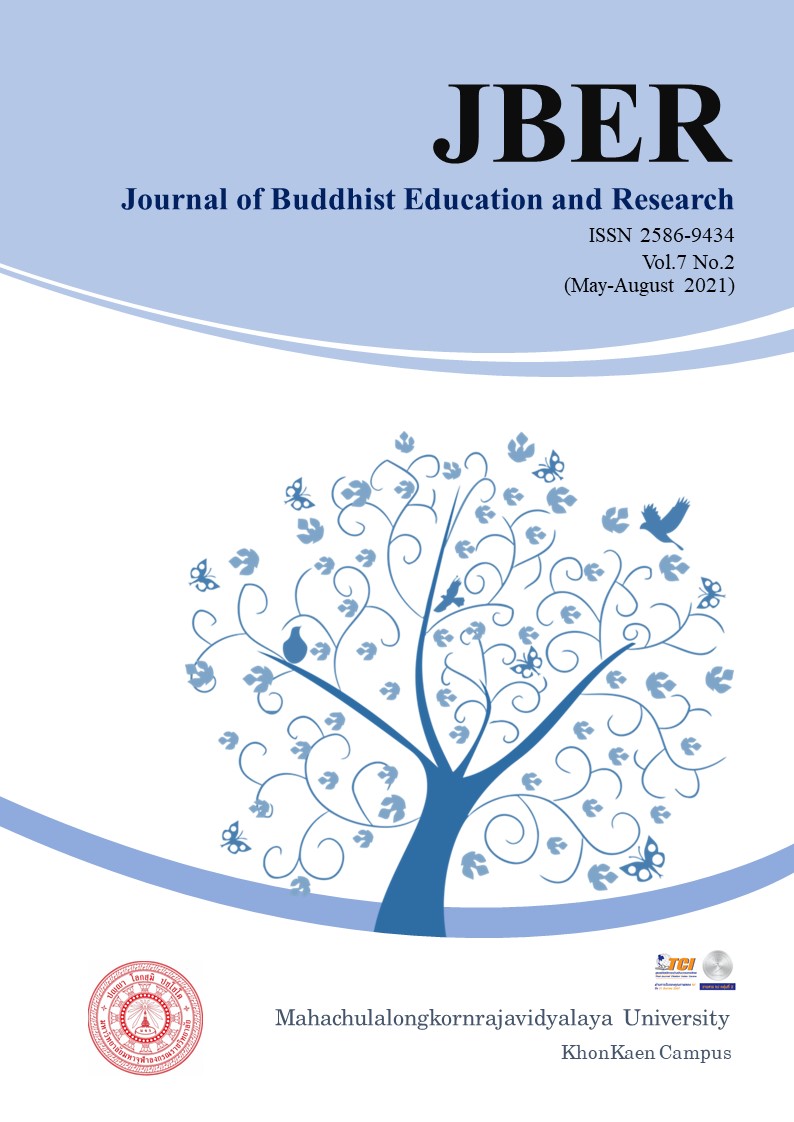PERSONNEL ADMINISTRATION BASED ON THE VII SAPPURISADHAMMAS IN THE PRAPARIYATIDHAMMA SCHOOLS GENERAL EDUCATION IN KHONKAEN PROVINCE
Keywords:
Personnel management; VII Sappurisadhammas; The Prapariyatidhamma Schools General EducationAbstract
The objectives of this research were: 1) to study the personnel administration according to the Seven SappurisaDhammas (Qualities of a Good Man) in Phrapariyattidhamma School, Department of General Education, Khon Kaen Province; 2) and propose guidelines for the development of personnel administration according to the Seven Sappurisa Dhammas in Phrapariyattidhamma School, Department of General Education, Khon Kaen Province. This study was carried out by means of the descriptive analysis. The research tool was the questionnaire. The statistics used in data analysis were: Frequency, Percentage, Mean, Standard Deviation. The obtained data were interpreted by the content analysis.
The research results were as follows:
1. The personnel administration according to the Seven Sappurisa Dhammas in the overall and aspect studied was at a high level of practice. The most practical aspect was ‘Dhammaññuta (knowing the law)’, followed by Atthaññuta (knowing the meaning) and the least practical one was ‘Puggalaññuta (knowing the individual).
2. The guidelines for personnel management according to the Seven Sappurisa Dhammas are as follows: 1) educational institutions should allow personnel involved in the personnel planning; 2) personnel administration should be transparent; 3) there should be clear workforce planning; 4) human resource development budget should be allocated; 5) they should be fair in setting criteria for personnel recruitment; 6) successful personnel should be praised; 7) there should be impartial in personnel promotion.
References
บรรจง หมายมั่น. (2548). การศึกษาความสัมพันธ์ระหว่างสัปปุริสธรรมกับสันโดษ เพื่อเป็นแนวทางในการค้นหาบุคลิกภาพธรรมาธิปไตย. วิทยานิพนธ์ปริญญาการศึกษามหาบัณฑิต คณะสังคมศาสตร์.มหาวิทยาลัยศรีนครินทรวิโรฒประสานมิตร.
ผ่องพรรณ ตรัยมงคลกุล. (2555). การวิจัยแบบผสม : ทางสายกลางของการวิจัย การออกแบบการวิจัย. กรุงเทพฯ : สำนักพิมพ์มหาวิทยาลัยเกษตรศาสตร์.
พระธรรมกิตติวงศ์ (ทองดี สุรเตโช). (2548). ภาษาธรรม. กรุงเทพฯ: สำนักพิมพ์เลี่ยงเชียง.
พระธรรมปิฎก (ป.อ. ปยุตฺโต). (2540). หนังสือธรรมนูญชีวิต. กรุงเทพฯ: พุทธจริยธรรม.
พระราชบัญญัติการศึกษาแห่งชาติ พ.ศ. 2542 และที่แก้ไขเพิ่มเติม (ฉบับที่ 2) พ.ศ. 2545 (ฉบับที่ 3) พ.ศ. 2553. (2563). สืบค้นเมื่อ 5 ธันวาคม 2563. จาก https://person.mwit.ac.th/01-Statutes/NationalEducation.pdf.
พระสามารถ อานนฺโท. (2548). ภาวะผู้นำตามหลักสัปปุริสธรรม. ปริญญานิพนธ์ศาสนศาตรมหาบัณฑิต. สาขาพุทธศาสน์ศึกษา มหาวิทยาลัยมหามกุฏราชวิทยาลัย.
ราชกิจจานุเบกษา. (2563). รัฐธรรมนูญแห่งราชอาณาจักรไทย พุทธศักราช 2560. สืบค้นเมื่อ 21 กรกฎาคม 2563. จาก http://www.ratchakitcha.soc.go.th/DATA/PDF/2560/A/040/1.PDF
ราชกิจจานุเบกษา. (2563). รัฐธรรมนูญแห่งราชอาณาจักรไทย พุทธศักราช 2550. สืบค้นเมื่อ 21 กรกฎาคม 2563. จาก https://www.ombudsman.go.th/10/documents/law/Constitution2550.pdf
วันทนา เมืองจันทร์. (2544). การปฏิรูปการศึกษา : คุณธรรมของผู้บริหารกับบทบาทในการประกันคุณภาพการศึกษา. วิทยาจารย์. 100(4), 21-25.





